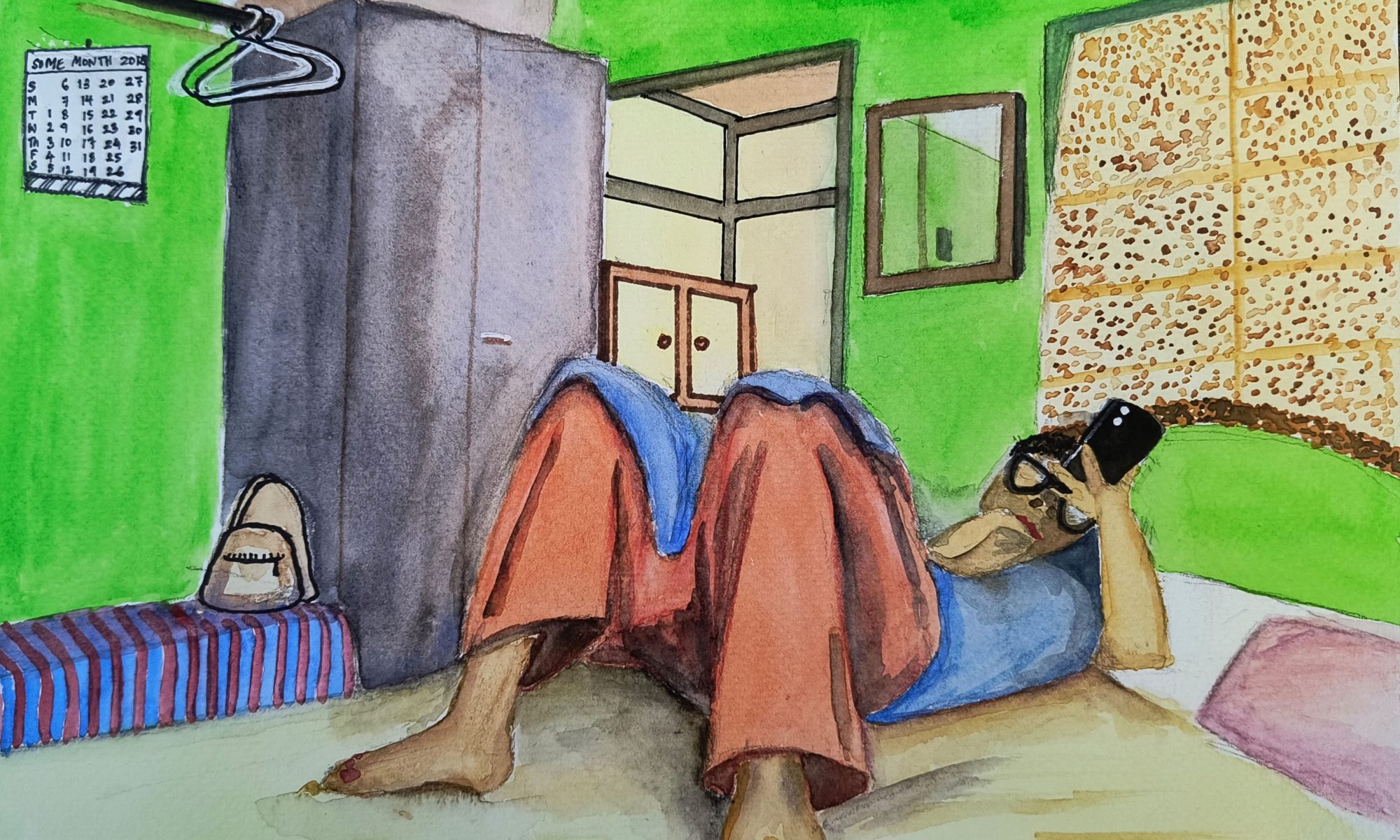ghut-tung…ghut-tung…ghunnn…ghut-tung…ghut-tung…ghunnn
For years it hypnotised anyone in the room
phrrrrrrr phrrrrrr phrrrrr is now its continuous tune.
This is the song of the Khaitan fan
As its been whirling for
More than four decades of its life span
It’s a solid one, he would say
Dusting it with a damp cloth
Indeed, not once did it break down
The black metallic box regulating its excited swirl
Its five circular notches directed to turn lever
Made this room in their Kalina home cooler.
The lever could never sit in between though
Never a little more than two, as the daughter wanted
Never a little more than four, as the son demanded.
Black box now replaced by a shiny white one
ghut-tung…ghut-tung…ghunnn… gone
phrrrr phrrrr phrrrr is the current song.
The bed he bought from a store selling second-hands
After he had brought home his bride from
Three thousand kilometres east, his native land
It’s the bed his two children slept in with their mother
While he preferred to sleep on a thick mattress
On the floor, without any sweaty bother
Walk on my back, he’d tell his five-year-old son
His daughter, dreamy with books, leaned on his bum.
But the bed — the site of the humans they bred —
Also held items of the past and for the future
Whenever they might be needed:
Extra pillows, a soft and light blanket,
Bedsheets and towels for when guests landed
An old doll without eyes; wrapped in a plastic packet.
Daughter in bed, he sipped his nightly Bagpiper’s
Relaxing on his armchair — also a second-hand —
He would tell her a story, a repetitive verse:
Appu and Monkey got on the 384
You know, the same bus I take to Ghatkopar
To get to the office, behind MG Road, on the third floor
But Appu and Monkey got down at the bank
They were carrying one hundred rupees in their pocket
Instead of buying a new dress, they created a fixed deposit
This careful planning will make their money grow!
Can you imagine how?
I know you’re not sleepy, so I’ll tell you now:
The bank gives an interest — like extra money — of nine percent
After one year, one hundred rupees becomes nine hundred!
Now my dear, isn’t that magnificent?
But what did Appu and Monkey do after, at dusk?
She would sleepily ask, reminding him that
The original story was about the pair getting on the bus.
She was eight then.
Now, as a PhD student researcher
She receives coins as a stipend
In a land passionate about potatoes, pints, poetry
Where universities love to babble about diversity
Whose government touts itself as a “knowledge economy”
Appu and Monkey’s tale of meticulous saving —
With her frugal lifestyle of penny-pinching —
Became her rule book for financial planning.
That bank that Appu and Monkey went to still exists
They now have air-conditioning and many computers
Cash withdrawal through machines in different corners.
His armchair is still in the same location
By the window with lacy curtains overlooking
The night jasmine tree in the garden
That bed is still there, as is an old bedcover
Some pillows have gone lumpy
While recent floods have destroyed the storage drawer
The walls continue to be painted the same shade of green
Just like he had brought home the bride
Just like the old room of Appu and Monkey lullabies.
But he is not there.
His daughter, doing her PhD, stuck to the armchair
Tries to figure how this all this fits into research:
Memories, smells, sounds: pillars, not ethnographic crutch.
It’s this scene that she holds dear
The one with which she hopes to fill a research gap
Of intimacies imprinted on an affective map
This scene: of her greying mother on that same bed,
The one where she was bred
The bed that held tears and nappies; where he fell dead.
This scene: of the mother resting there for an afternoon nap
Mobile phone in her hand, reading messages on WhatsApp
Sending emojis and gifs; mistaking “namaste” for “clap”
In his absence, the blue light is the only illumination
In the darkened afternoon lifelong cove
Cooled by the phrrrr phrrrr phrrrr swirling above.
Ethnographic statement
This poem is an account of materiality through time-tracking and place-making, viewed from within the contours of home while wearing the ethnographer’s lens. While it is drawn from a continuing research about older women’s use of smartphones and social media (Borpujari, 2024) in the face of the precarity of doing a PhD in Ireland (McGuire, 2022), it leans on the fragment of memory afforded by intimate ethnography (Waterston and Rylko-Bauer, 2006). The poem ties together fragilities across time, of what endures and what falls apart; of what is held together not by design but through gestures that are uneven and improvised. Blurring the lines between intimate and autoethnography (Ellis, 2004; Holman Jones, 2005), it speculates the conditions of possibility through these fragilities, while holding together the weight and negotiation of care in practical forms; teasing apart the strands of kinship, while living with and through the edges of memory and materiality, caution and care.
References
Borpujari, P. (2024). “What shall I write tomorrow?” When Older women reclaim New Life-course on Facebook. In Routledge eBooks (pp. 176–188). https://doi.org/10.4324/9781003429340-19
Ellis, C. (2004). The ethnographic I: A methodological novel about autoethnography. Walnut Creek, CA: AltaMira Press.
Holman Jones, S. (2005). Autoethnography: Making the personal political. In N. K. Denzin, & Y. S. Lincoln (Eds.), The Sage Handbook of Qualitative Research (3 ed., pp. 763-792). SAGE Publications Ltd.
McGuire, P. (2022, October 18). ‘I wouldn’t advise anyone to do a PhD in Ireland.’ The Irish Times. https://www.irishtimes.com/ireland/education/2022/10/18/i-wouldnt-advise-anyone-to-do-a-phd-in-ireland/
Waterston, A., & Rylko-Bauer, B. (2006). Out of the shadows of history and memory: Personal family narratives in ethnographies of rediscovery. American Ethnologist, 33(3), 397–412. https://doi.org/10.1525/ae.2006.33.3.397

